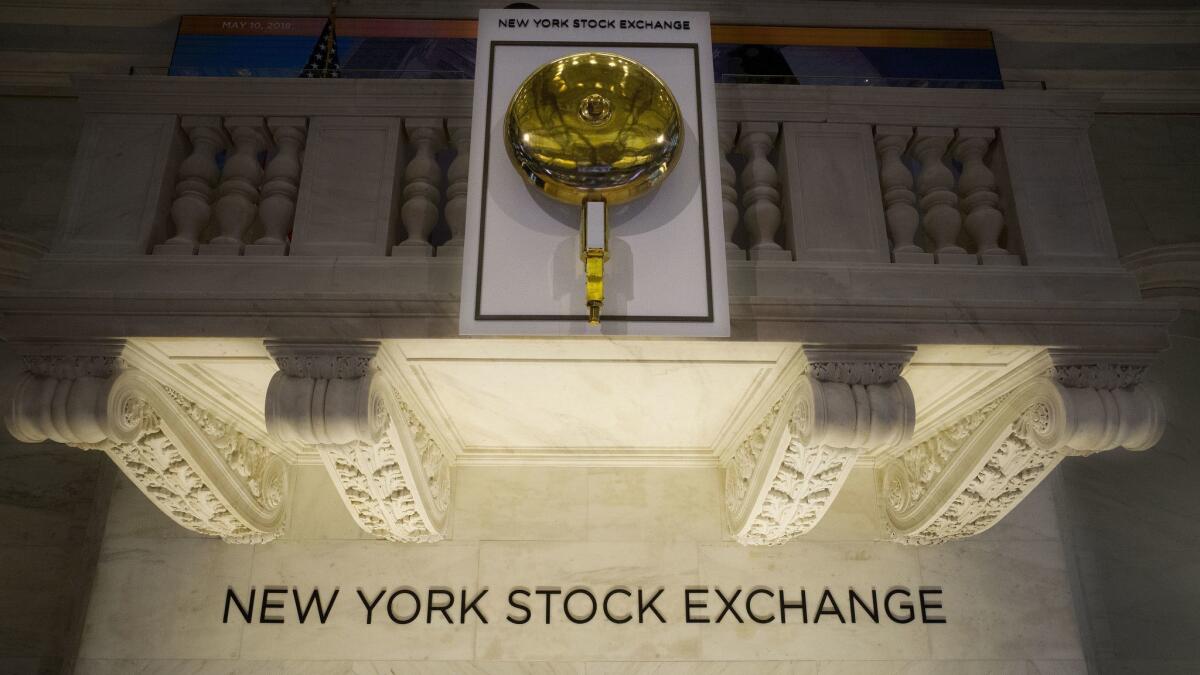Healthcare and small-cap stocks slump. Qualcomm soars for a second day

- Share via
Stocks on Wall Street finished a wobbly day of trading Wednesday with modest losses that erased most of the market’s slight gains from a day earlier.
A sharp sell-off in healthcare companies far outweighed gains in technology and other sectors. Smaller-company stocks fell more than the rest of the market.
Insurers drove the healthcare-sector slide for the second straight day. Investors fear the potential impact on profits from health reform ideas being discussed in Washington and on the presidential campaign trail.
Qualcomm led the gainers in the technology sector. Intel climbed after pulling out of the smartphone modem market. And T-Mobile and Sprint slumped on a report that the Justice Department is questioning their proposed merger.
PepsiCo and Morgan Stanley rose after delivering better-than-expected quarterly results. IBM and Netflix fell after reporting their earnings.
Investors are poring over earnings reports this week, focusing on companies’ profit and revenue outlooks for the rest of this year. Analysts expect that overall, first-quarter results for companies in the Standard & Poor’s 500 index will be the weakest in nearly three years.
“The market is in wait-and-see mode,” said Jamie Lavin, global investment specialist at J.P. Morgan Private Bank. “We’re only 10% through earnings season, but so far, so good.”
The S&P 500 fell 6.61 points, or 0.2%, to 2,900.45. The Dow Jones industrial average edged down 3.12 points, or less than 0.1%, to 26,449.54.
The Nasdaq composite slipped 4.15 points, or 0.1%, to 7,996.08. The Russell 2000 index of small-cap stocks slid 15.19 points, or 1%, to 1,567.60.
Bond prices held steady. The yield on the 10-year Treasury note remained at 2.59%.
The market has rebounded strongly from a steep sell-off late last year. The Federal Reserve helped spur the market’s rebound early this year when it said it may not raise interest rates at all in 2019. The benchmark S&P 500 remains within 1.5% of the all-time high it reached Sept. 20.
Wednesday’s downbeat finish on Wall Street followed uneven trading in global markets, despite news that China’s economy grew at a better-than-expected 6.4% annual pace in the January-through-March quarter. The data suggest Beijing’s efforts to halt a slowdown are working, but its economy is still growing at the weakest pace since 2009.
Several health insurers helped pull the market lower. Anthem sank 3.6%, Cigna slid 3.7%, and UnitedHealth Group fell 1.9%.
The losses pulled the healthcare sector into the red for the year, with a loss of 0.9%. The other 10 sectors in the S&P 500 are up for the year.
All told, healthcare has fallen 4.5% so far this week.
The decline is partly due to investors favoring cyclical growth sectors, such as materials, energy and technology, at the expense of stocks that seem less risky.
More recently, presidential politics has hurt the sector. Democratic presidential candidates such as Sen. Bernie Sanders of Vermont, who is emerging as the early fundraising frontrunner, has been making the case for a “Medicare for all” plan that could replace private coverage.
“There is a growing perception that the popularity of universal healthcare is growing among the electorate, forcing investors to take notice as the odds of meaningful regulation increase,” Alec Young, managing director of global markets research at FTSE Russell, said in a research note Wednesday.
Although the likelihood of a major healthcare overhaul remains relatively low, enough uncertainty exists that investors are now selling first and asking questions later, Young added.
Qualcomm leaped 12.2%, the biggest gain in the S&P 500. That built on its Tuesday gain of 23%. Traders have been welcoming the news that the mobile chipmaker’s bitter legal dispute with Apple has ended. The dispute centered on technology that enables iPhones to connect to the internet. Apple rose 1.9%.
In a related move, Intel climbed 3.3% after pulling out of the market for 5G smartphone modems. The company said it will focus on opportunities in computer modems and other devices.
Sprint slid 6.2% and T-Mobile fell 2.2% after a Wall Street Journal report cast doubt on the likelihood of government approval of the companies’ $26.5-billion merger.
The Journal said that in a meeting this month, Justice Department antitrust personnel reviewing the takeover questioned the companies’ reasoning for it. Talks between regulators and the companies are ongoing, according to the report, which cited unnamed people familiar with the matter.
PepsiCo climbed 3.8% after the maker of sodas and snacks reported better-than-expected first-quarter profit. It said earnings at its Frito-Lay division were particularly strong.
Morgan Stanley rose 2.6% after delivering better-than-expected quarterly results.
United Continental Holdings advanced 4.8% after the airline’s first-quarter profit doubled, beating forecasts, as the airline carried more passengers and contained costs.
Railroad operator CSX climbed 4% after it turned in quarterly results that topped Wall Street’s forecasts on a mix of volume growth and lower costs.
IBM dropped 4.2% and Netflix fell 1.3% after both companies reported their earnings.
Energy futures finished mostly lower. Benchmark U.S. crude oil fell 0.5% to settle at $63.76 a barrel. Brent crude, the international standard, inched down 0.1% to close at $71.62 a barrel.
Wholesale gasoline rose 0.5% to $2.04 a gallon. Heating oil fell 0.6% to $2.07 a gallon. Natural gas fell 2.1% to $2.52 per 1,000 cubic feet.
Gold was little changed at $1,276.80 an ounce. Silver rose 0.2% to $14.93 an ounce. Copper climbed 1.3% to $2.97 a pound.
The dollar strengthened to 112.07 yen from 111.99 yen. The euro rose to $1.1298 from $1.1288.
More to Read
Inside the business of entertainment
The Wide Shot brings you news, analysis and insights on everything from streaming wars to production — and what it all means for the future.
You may occasionally receive promotional content from the Los Angeles Times.










